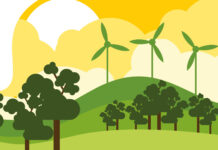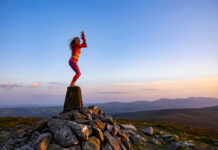
Q: I’m curious about how harmful some of my cooking practices really are. Do you have tips for being more environmental in the kitchen?
A: Some of us might wonder, as we make meal after meal, what to do with residual heat in the oven, how to use left-over boiling water, and whether the oven or the stove-top is more efficient. But Dr. Hannah Daly, Professor in Sustainable Energy and Energy Systems Modelling at University College Cork, assures us that being ecological in the kitchen is actually quite simple.
The two most important things to be aware of are “reducing red meat as much as possible and wasting as little food as possible,” she explains.
“The broad food system, how we make food, agriculture, all of the transportation, and the processing, counts for a lot of our greenhouse gas emissions,” says Daly, noting that between a quarter and a third of emissions come from our global food system, also a main contributor to biodiversity loss.
Ireland produces a lot of high-carbon-emitting food, which is “like having a big coal industry,” says Daly, and it’s something that’s important to tackle.
“In general, animal products are more carbon intensive than land-based products,” she explains. It might not seem like such a big difference, but animal-based foods tend to contribute to the problem, while plant-based foods help fix it. Plant-based food often sequesters carbon in its growth, while animal-based releases methane into the atmosphere. For example, if you cook with olive oil instead of butter, olive trees sequester carbon, as food that is grown on trees is good for the climate. Butter, meanwhile, comes from cows which emit a lot of methane.
COMPOSTING
Another double-whammy, Daly is a big fan of composting.
“I love making compost and using that in the veg garden, making a natural fertiliser,” she says. “It also addresses the food waste question.” When you put food waste in the landfill, “it actually creates methane gas,” or greenhouse gas, she explains. If you compost it, not only is that gas not produced, you can use it to grow your own food and flowers. So composting is itself a positive for the environment, while wasting food and putting it in landfill contributes to the problem.
For practices in the kitchen, Daly’s other tip is, as with the rest of the home, being cognizant of energy usage, which brings bills down and reduces energy waste.
Daly recommends induction hobs as a great replacement for gas cookers. Gas, including from cookers, is also very bad for indoor air quality, she notes, causing a lot of asthma which is especially bad in Ireland.
Stay mindful about not using the oven wastefully and pressure cookers, slow cookers, and air friers are very efficient, she says, as is the microwave: if you want to bake potatoes, it takes over an hour in the oven and just a few minutes in the microwave. As is oft-heard, when you are boiling water in the kettle, just boil the amount you need to waste as little energy as possible.
For those of us panicking about plastic, it’s not the biggest problem when it comes to greenhouse emissions: “Plastic is terrible for litter and the oceans,” Daly says, and manufacturing uses fuel and energy, “but it’s not the big thing people think it is at all.” Unlike with fossil fuel use in transport and heating, “the carbon state in the plastic doesn’t get released into the air,” Daly explains, although she is pleased that UCC is now a single-use-plastic-free campus.
COORDINATED APPROACH
All this means, when it comes to climate change, it’s “more overwhelmingly about what you eat than how you package it and cook it,” says Daly.
This being said, Daly thinks major transformation will be less about individual choice and more about organisational changes, the government response to Covid being an example where “there was a collective threat and the government whipped into action and showed huge leadership and engagement with scientists. People changed their lives profoundly, not out of self-interest but for vulnerable people,” she says. “We’re not seeing that level of coordinated communication on climate.”
Daly is reading a book that she’s found inspiring: ‘Saving Us: A Climate Scientist’s Case for Hope and Healing in a Divided World’ by Katharine Hayhoe. And if you’re interested in exploring statistics and charts on carbon emissions of food and transport, she also recommends ourworldindata.org, a somewhat addictive site for information.
We need to eat and we need to cook, but, simply put, reducing animal-based foods and increasing plant-based foods in your diet, trying not to waste food, and using less energy are what will have the biggest impact.











